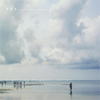 This, I believe, is the ninth full-length album that Tokyo’s Yasuhiko Fukuzono has released since 2004, but this young composer has somehow managed to balance his voluminous output with an unwavering elegance and painstaking meticulousness. The glitchy pastoral ambience of Light in August, Later is certainly nothing new, but it is nevertheless done quite well…a bit too well, actually. While technically flawless, there are too few cracks to allow very much emotion to seep in.
This, I believe, is the ninth full-length album that Tokyo’s Yasuhiko Fukuzono has released since 2004, but this young composer has somehow managed to balance his voluminous output with an unwavering elegance and painstaking meticulousness. The glitchy pastoral ambience of Light in August, Later is certainly nothing new, but it is nevertheless done quite well…a bit too well, actually. While technically flawless, there are too few cracks to allow very much emotion to seep in.
Someone Good
The eight pieces comprising this album are all very much of a hushed and shimmering piece, as the languorous spell begun with “Different Sky” continues unbroken for its duration. It is very difficult to tell exactly which instruments Fukuzono is employing most of the time, as the source material is often laptopped into an amorphous, soft-focus haze. Occasionally, some sparse acoustic guitar, crackling field recordings, or fragile piano will appear, but the backbone of the album is its omnipresent bed of warm, quavering drones. That, of course, is perfectly fine by me, as the inability to distinguish individual elements serves the pervading hypnotic tranquility quite well. Unfortunately, the corresponding sacrifice is that many of the songs lack distinct personalities. While Yasuhiko’s understated amniotic soundscapes are always quite pleasant, they are also a bit bloodless and sterile and rarely leave a lingering memory behind them.
To his credit, aus seems well aware of this and has attempted to break up the album with pieces that could be considered actual songs, albeit without departing very much from his gentle, sleepy template. For this, he enlisted the dubious aid of Japanese vocalist Cokiyu. I am decidedly not a fan of her Sigur Ros-esque vocals, as they are too meek and characterless for me, merely sounding like yet another heavily processed instrument. However, they seem to have inexplicably had an invigorating effect on Fukuzono, as the vocal pieces are some of the most overtly melodic and human on the album (particularly “Little Song at Little Time,” which actually features a beat and a distinct crescendo of sorts).
The album does not truly come alive until the end, however. The penultimate track (“Remnant”) features some welcome feedback and sizzle that hint that aus is capable of something a bit deeper. Unexpectedly, he then promptly delivers that depth with the epic closer “A World of Dazzle,” which stands out (alone, sadly) as a truly stirring and beautiful piece. While still characteristically slow-moving, fragile, and melancholic, it diverges from its predecessors by delivering strong and memorable melodies, a gritty underlying crackle, subtly oscillating dissonance, digitally mangled piano, and snaking, intertwining violins that snowball in intensity and emotion resonance.
Fukuzono can certainly whip up an impressive slow-burning intensity when sets his mind to it, but it occurred far too seldom on Light in August, Later to make me a fan. The raw material of a formidable artist is certainly evident, but aus will need to smash quite a few more holes in his protective wall of austere perfectionism to realize that potential.
Samples:
Read More

